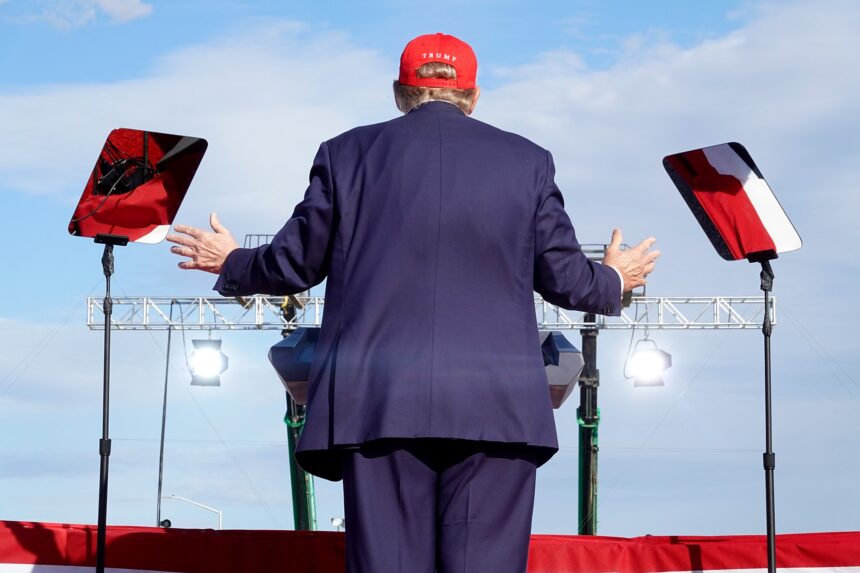Summary & Additional Remarks by Geopolist | Istanbul Center for Geopolitics:
When Americans voted for Donald Trump in 2024, they did so amid widespread dissatisfaction with Joe Biden’s handling of the economy—despite key indicators suggesting that the U.S. was on a strong economic footing. GDP growth was steady, inflation had eased, unemployment was at historic lows, and stock markets were reaching new highs. However, Trump campaigned on the promise of lowering costs for average Americans, revitalizing domestic manufacturing, and prioritizing economic self-sufficiency.
Now, just months into his presidency, early economic data suggests that his policies—particularly his aggressive tariff strategy—are already causing significant harm to the U.S. economy. Instead of bringing prosperity, Trump’s actions are fueling uncertainty, increasing costs for businesses and consumers, and threatening economic stagnation.
Economic Contraction and Rising Uncertainty
The Atlanta Federal Reserve’s latest forecast projects that the U.S. economy will shrink at an annualized rate of 2.8% in the first quarter of Trump’s presidency—a stark reversal from the stable growth seen in previous years. This sharp contraction is largely attributed to Trump’s tariffs on Canada and Mexico, which were initially assumed to be political bluffs but are now being implemented in full force.
While economic projections can vary, the Federal Reserve’s Beige Book—another key economic indicator—suggests that growth is not just slowing but could be at risk of turning negative. Across the board, businesses are slashing investments, adjusting production, and holding back hiring due to the uncertainty surrounding Trump’s trade policies.
The Economic Uncertainty Index Reaches Historic Highs
One of the most alarming trends is the sharp increase in economic uncertainty. The Economic Policy Uncertainty (EPU) Index has reached levels not seen since the early days of the COVID-19 pandemic and the 2008 financial crisis. Business leaders are struggling to plan for the future as Trump’s trade and economic policies shift unpredictably, creating an unstable investment environment.
Economists warn that this type of radical uncertainty is particularly damaging to economic growth. When businesses don’t know what the next six months will look like, they postpone major investments, delay hiring, and scale back production—all of which contribute to a slowdown in GDP growth.
Tariffs Are Crippling U.S. Manufacturing
Trump’s tariffs were meant to boost American manufacturing by discouraging imports and incentivizing domestic production. However, the reality is playing out quite differently:
- Higher Costs for Inputs
- Many American manufacturers rely on imported materials and components to build their products. Tariffs on Canadian and Mexican goods have made raw materials like steel, aluminum, and electronic components significantly more expensive, raising production costs across industries.
- Declining Factory Activity
- The Institute for Supply Management (ISM) manufacturing index fell to 50.3 in February, indicating that factory activity is stagnating.
- Orders and employment in the manufacturing sector are contracting, and input prices have surged to their highest level since June 2022 as businesses struggle with higher material costs.
- Small Businesses Hit the Hardest
- Small businesses, which often lack the financial cushion of large corporations, are being disproportionately affected.
- Unlike larger firms, small businesses can’t easily absorb rising costs or shift their supply chains. Many are already cutting jobs or passing increased costs onto consumers.
Ironically, the very industries that were supposed to benefit from Trump’s “America First” policies—manufacturing and small businesses—are the ones suffering the most from his tariff-driven economic strategy.
Consumers Are Feeling the Pain
Beyond business investment and manufacturing, Trump’s tariffs are also driving up consumer prices on essential goods. Tariffs function as a tax on imported goods, making them more expensive for American buyers.
What’s Getting More Expensive?
- Gasoline: Tariffs on imported fuel products could drive up gas prices at the pump.
- Food: Higher costs on agricultural imports increase grocery prices.
- Home Goods & Electronics: Many everyday household products include foreign-made components, and tariffs will drive their prices up.
- Electricity & Energy Costs: Higher input costs for energy production could lead to rising utility bills.
The Wall Street Journal has detailed how these rising costs are squeezing middle-class families, many of whom voted for Trump expecting financial relief. Instead, they are now facing higher living expenses and stagnant wages.
Stock Market Plunge and Investor Panic
One of the most visible signs of the economic fallout has been the rapid decline in stock markets. Over the past month:
- The S&P 500 has fallen 6%, erasing billions of dollars in market value.
- The NASDAQ has dropped 8%, reflecting investor fears about tech and manufacturing sector slowdowns.
- U.S. stocks are badly underperforming their European counterparts, indicating that the downturn is specific to Trump’s economic policies rather than a global trend.
In a telling moment, a recent stock market crash happened in real time as Trump reaffirmed his commitment to tariffs during a press conference. Instead of calming investor fears, he blamed “globalists” for the decline—further fueling concerns that his administration is ignoring the real economic consequences of its policies.
Economic Nationalism Over Prosperity
Trump’s policies are increasingly resembling a form of economic self-reliance that prioritizes isolation over prosperity. Historically, similar economic approaches have been disastrous:
- North Korea’s “Juche” policy emphasized self-sufficiency but led to economic stagnation and hardship.
- Stalin’s Iron Curtain policies cut off trade, stifling Soviet economic growth.
- Franco’s Spain and Peron’s Argentina tried autarky (economic independence) but suffered long-term stagnation.
Trump’s modern version of economic nationalism is following the same dangerous trajectory. While he markets it as a strategy to strengthen America, the reality is that it’s making the country poorer, more isolated, and less competitive on the global stage.
Conclusion: Buyer’s Remorse?
Trump ran on the promise of making America more competitive, less expensive, and stronger economically. Instead, early indicators suggest that his policies are dragging the country into recession, raising consumer prices, and crippling business investment.
His erratic decision-making—such as delaying some tariffs while enforcing others—only increases policy uncertainty, making it even harder for businesses and investors to plan for the future.
Some Trump supporters are now trying to rationalize the pain, with Republican lawmakers saying that Americans should be willing to “do what it takes” to support Trump’s policies, even if that means paying more for everyday goods. Others have embraced bizarre solutions—Trump’s Secretary of Agriculture recently suggested that Americans should raise chickens in their backyards to cope with high egg prices.
In the end, America voted for a leader they thought would fix inflation and deregulate the economy—a modern-day Reagan. Instead, they got a dime-store Mao, willing to sacrifice economic stability in pursuit of isolationist policies.
The question now is how long Americans will tolerate these consequences before demanding a change.
Read more here.







